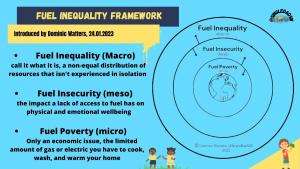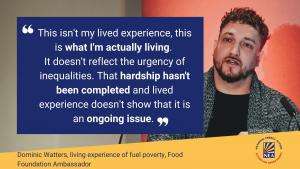How can we tackle the energy crisis?
Dominic recently spoke at the National Energy Conference on this subject. We've included links to his talk within this short Q&A with Dominic exploring the Fuel Inequality Framework, the concept of living experience and the definition of 'Fuel Deserts.'
Dominic also recently joined BASW UK Chair, Julia Ross in conversation about challenging social injustice, the long-term effects of poverty and what needs to change.
Dominic Watters speaks to BASW about the Energy Crisis
1. What are the different ways that fuel poverty impacts on people?
My daughter and me have always had pay-as-you-go gas & electric, and the council estate we live in is a ‘fuel desert’. At the National Energy Action conference 2023 I introduced a definition I developed from actually living this hardship, “fuel deserts are where people do have limited access to gas & electricity, particularly if they are poor or have limited mobility” (Watters, 2023). Let me add to this. If my electric goes in the middle of the night, there is nowhere in the estate I can top-up. It’s all well and good saying you should plan for this, but if you haven’t got, you just haven’t got. As a single dad when my gas is on emergency it’s like my whole life is on emergency. As when it is gone that’s your fridge gone. And when your electric goes in the night by the morning your food in the freezer is wasted. You cannot warm or cook your daughter’s breakfast, or shower, or put on her favourite morning cartoon. I stress this as an example to show people how fuel poverty isn’t experienced in isolation, it is often coupled with food insecurity. The many inequalities the poor experience, together with the marginalisation brought on by council estate life, can led to a general sense of despair that makes change feel hopeless. Social workers need to be aware of the impact fuel poverty has on someone’s wellbeing and how Joseph Rowntree Foundation 2023 report finds, 90% of families on Universal Credit do not have enough money to afford the essentials.

2. Too many people have living experiences of fuel poverty across the UK. What immediate action could the UK Government take to lift people out of fuel poverty and prevent households from being affected?
The UK Government needs to include voices of the poor in creating the policies that impact our daily realities and I hope this can be a key ask of BASW’s Anti-Poverty Campaign. Support for the families with nowhere to turn will help to enable an ability to engage in society and services. As first highlighted in my book, Universal Credit is a dehumanising system that, as Patrick Butler of the Guardian writes (27.02.2023), falls short of allowing people to afford even the basic essentials. Challenging the Government about the broken benefit system needs to be part of the work we do as at present it supports the idea that the poor are undeserving.
From the idea of lived experience I have developed the concept of ‘living experience’, (Watters, 2021) that highlights the tensions and urgency of the inequalities disadvantaged groups, often on welfare, experience right now. Inequality is not a thing of the past. Rather the poor have been silenced through snobbery for far too long and social work has a duty to include voices of the people who are currently facing these daily realities. I hope its ok to share this: when I was at university I was on Universal Credit, a single parent, facing eviction from my council flat, and experiencing acute food and fuel insecurity long before these terms were ever in the British media (2019). I reached out to my university for financial assistance, but I was turned away. The same university now has a foodbank for all their students. Make it make sense?! The poor have been in a cost-of-living crisis long before the phrase was popularised but it's only now these issues are affecting the middle classes that they are getting this attention. In one way this coverage of food and fuel poverty is doing away with the attached shame & stigma but in another way, it is not acknowledging the voices of those hardest hit by these inequalities. Social work educators, associations, and regulators need to reflect deeply on why food insecurity and fuel poverty are not part of their curriculum or professional guidance. I have developed the Food is Care campaign with support from SWU that is fighting for these gaps to be addressed. But the fact it’s taking a voice like mine to put these oversights on the table speaks volumes.
3. How do you think social workers can best support people affected by fuel poverty?
A deep understanding of the communities you serve is a great starting point, as this will hopefully do-away-with any approach that sees a hierarchical separation between the social worker and the service user. To this aim I have developed a ground-breaking Poverty and Food Insecurity training that helps to build an awareness of the inequalities experienced by some of the most disadvantaged in society. The training is underpinned by the Fuel Poverty Framework I introduced at the Birmingham 2023 Conference as this anti-oppressive approach provides a three-tier model that removes the ‘fault’ from the individual through a focus on the failings of societal structures. I have delivered this training to social work teams, both adult and children, up and down the country with amazing results. BASW has helped to promote my training uniquely delivered by a voice of ‘living experience’, (Watters, 2021) but I am also hoping through my involvement in BASW’s Anti-Poverty campaign I can prompt a review into why food and fuel poverty are not currently noted in our Professional Capability Frameworks. Let’s be a lead in bringing about change to help those in a constant state of insecurity.

